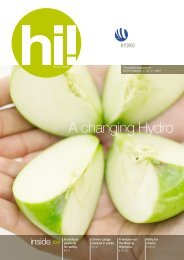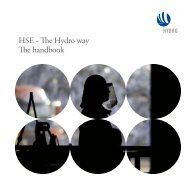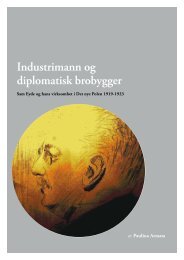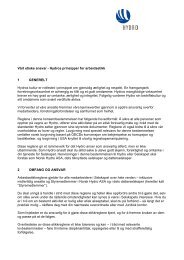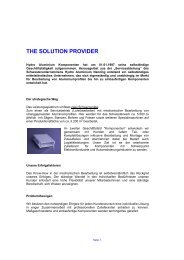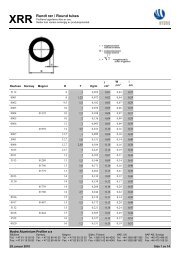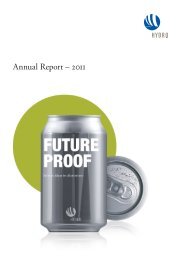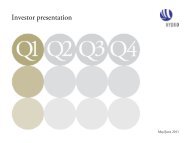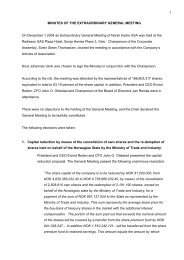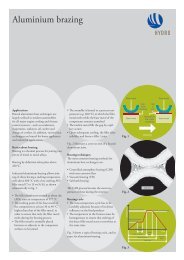Hydro is a Fortune 500 energy and aluminium supplier operating in ...
Hydro is a Fortune 500 energy and aluminium supplier operating in ...
Hydro is a Fortune 500 energy and aluminium supplier operating in ...
Create successful ePaper yourself
Turn your PDF publications into a flip-book with our unique Google optimized e-Paper software.
36<br />
The <strong>Hydro</strong> experience <strong>in</strong> Utkal, India<br />
Dur<strong>in</strong>g the 1990s, <strong>Hydro</strong> Alum<strong>in</strong>ium was engaged<br />
<strong>in</strong> develop<strong>in</strong>g a bauxite <strong>and</strong> alum<strong>in</strong>a project<br />
<strong>in</strong> Or<strong>is</strong>sa <strong>in</strong> India. <strong>Hydro</strong> owned one third of the<br />
company set up for the project, with two major<br />
Indian <strong>in</strong>dustrial companies, Indal <strong>and</strong> Tata, as<br />
equal partners. The project site was <strong>in</strong> a remote<br />
area with a mixed population, predom<strong>in</strong>antly<br />
low caste H<strong>in</strong>dus <strong>and</strong> <strong>in</strong>digenous Khonds.<br />
When <strong>Hydro</strong> entered the project <strong>in</strong> 1992,<br />
India had just changed its economic policy<br />
to allow foreign participation <strong>in</strong> jo<strong>in</strong>t ventures.<br />
Indian authorities, both at federal <strong>and</strong> local<br />
(state) level, thus encouraged foreign <strong>in</strong>vestment<br />
<strong>in</strong> extractive <strong>in</strong>dustries. In l<strong>in</strong>e with official Indian<br />
assimilation policy, little or no attention was<br />
paid to <strong>in</strong>digenous groups that were liv<strong>in</strong>g on<br />
or close to areas with m<strong>in</strong>eral resources.<br />
However, both national <strong>and</strong> <strong>in</strong>ternational<br />
NGOs were <strong>in</strong>creas<strong>in</strong>gly direct<strong>in</strong>g their focus<br />
to the rights <strong>and</strong> needs of these groups.<br />
<strong>Hydro</strong>’s knowledge of Indian bus<strong>in</strong>ess culture<br />
was limited, <strong>and</strong> so was the exposure of Indian<br />
<strong>in</strong>dustrial companies to foreign norms <strong>and</strong> st<strong>and</strong>ards,<br />
especially with regard to environmental<br />
<strong>and</strong> social <strong>is</strong>sues. Acknowledg<strong>in</strong>g that it was<br />
play<strong>in</strong>g on foreign turf, <strong>Hydro</strong> chose a strategy<br />
where most local <strong>is</strong>sues were left for the Indian<br />
Jo<strong>in</strong>t venture partners to deal with.<br />
There were many reasons why the project<br />
made little progress dur<strong>in</strong>g the 90s: conflict<strong>in</strong>g<br />
<strong>in</strong>terests between national <strong>and</strong> local politics;<br />
a bureaucracy unfamiliar with the requirements<br />
of <strong>in</strong>ternational <strong>in</strong>dustrial companies; a crosssection<br />
of NGOs with various agendas, but with<br />
the common denom<strong>in</strong>ator that they all purported<br />
to be the sole protector of the <strong>in</strong>terests of the<br />
<strong>in</strong>digenous people, <strong>and</strong> thus made it difficult<br />
for the project management to establ<strong>is</strong>h direct<br />
communication with those affected by the<br />
project. However, it must also be admitted that<br />
the <strong>in</strong>dustrial partners had not given sufficient<br />
attention to the important social <strong>is</strong>sues that were<br />
related to the project. <strong>Hydro</strong> withdrew from the<br />
project <strong>in</strong>n 2002.<br />
The Utkal project was extremely complex <strong>and</strong><br />
represents, therefore, a variety of the challenges<br />
that companies must take <strong>in</strong>to consideration when<br />
they enter foreign <strong>and</strong>, as <strong>in</strong> th<strong>is</strong> case, virg<strong>in</strong><br />
territory. At the outset, <strong>Hydro</strong> had little knowledge<br />
of Indian political <strong>and</strong> bus<strong>in</strong>ess culture, or of the<br />
<strong>is</strong>sues perta<strong>in</strong><strong>in</strong>g to the <strong>in</strong>digenous population<br />
at the site <strong>and</strong> their position <strong>in</strong> Indian society.<br />
A better underst<strong>and</strong><strong>in</strong>g would certa<strong>in</strong>ly have helped,<br />
<strong>and</strong> was also gradually accumulated dur<strong>in</strong>g<br />
the course of the project. <strong>Hydro</strong> probably ended<br />
up with as much knowledge of site conditions<br />
<strong>and</strong> the <strong>in</strong>digenous Khonds as its Indian bus<strong>in</strong>ess<br />
partners <strong>and</strong> most of the <strong>in</strong>ternational<br />
NGOs.<br />
However, what <strong>is</strong> obvious <strong>in</strong> h<strong>in</strong>dsight <strong>is</strong> that<br />
we lacked the required systematic <strong>and</strong> thorough<br />
approach, where all relevant <strong>is</strong>sues are identified,<br />
analysed <strong>and</strong> prepared for.



